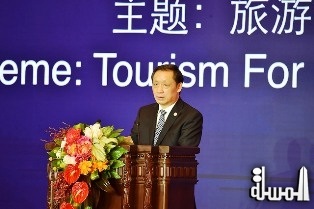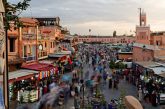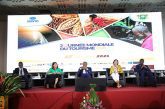
First World Conference on Tourism for Development: Premier Li of China calls for higher financing for development in tourism
aTP- Arab tourism portal- The role of tourism in fighting poverty and building peace were the key focus of the First World Conference on Tourism for Development. Opening the conference, Premier Li Keqiang underlined the role of tourism in lifting people out of poverty and the importance of stepping up international cooperation in tourism. The event, organized by UNWTO and the Government of the People’s Republic of China, gathered in Beijing 1000 participants from over 100 countries.

Premier Li Keqiang emphasized tourism’s capacity to stimulate economic growth, create jobs and foster inclusive development. "The global economy is lacking in growing momentum and needs a new driving force. As one of the fastest-growing and most resilient industrial sectors, tourism plays an important role in boosting world economic recovery" he said. During the occasion, China announced the launch of an international tourism cooperation plan.

Addressing the conference the President of Mozambique, Filipe Jacinto Nyussi, emphasized that inclusion through tourism requires investment in education and capacity building.

The links between development and peace were stressed by UNWTO Secretary-General, Taleb Rifai, who said: “There can be no development without peace and no peace without development”.
In a message delivered to the conference by the UN Under-Secretary-General for Economic and Social Affairs, Mr Wu Hongbo, United Nations Secretary-General Ban Ki-moon said: “When tourism is well-managed, it has tremendous capacity to create decent jobs, provide opportunities for inclusion and education, and contribute to preserving cultural heritage and the environment.”
The conference included three main panel sessions dedicated to the contribution of tourism to the Sustainable Development Goals (SDGs), to poverty alleviation and to peace.
During the summit session, moderated by CNN’s Richard Quest, participants called for an integrated approach to tourism development that can contribute effectively to the SDGs. Issues discussed included effective resource management, the role of the private sector and the need for the SDGs to be understood by all – citizens, policy makers, and the business community.

Participants in the session on tourism and poverty underlined that there is a lack of understanding and research on the impact of the sector on poverty levels. They called for better monitoring, measuring and communication through both solid indicators and people-centered stories.
The third session of the conference, dedicated to tourism and peace, stressed how people-to-people diplomacy is inherent to tourism while calling for investment in education and youth to build more stable societies.
The full list of speakers included: the Vice-Presidents of the Islamic Republic of Iran, Mauritius and Vanuatu, the United Nations Under-Secretary-General for Economic and Social Affairs Wu Hongbo, representing the UN Secretary-General, ministers and high-level tourism officials from Argentina, Bahrain, Bulgaria, Cambodia, Czech Republic, Ethiopia, Germany, Georgia, Indonesia, Iran, Jordan, Kenya, Lithuania, Malta, Malaysia, Mauritius, Mexico, Republic of Korea, Saudi Arabia, Slovenia, Sri Lanka, South Africa, UK, USA, Vanuatu and Zimbabwe, and SDG Advocate Ambassador Dho Young-Shim, as well as representatives of the World Bank, the Japan International Cooperation Agency (JAICA), the World Tourism Cities Federation, the Petra National Trust Fund, the Beijing Municipality, Guangxi Zhuang Autonomous Region, and Guizhou Province.








